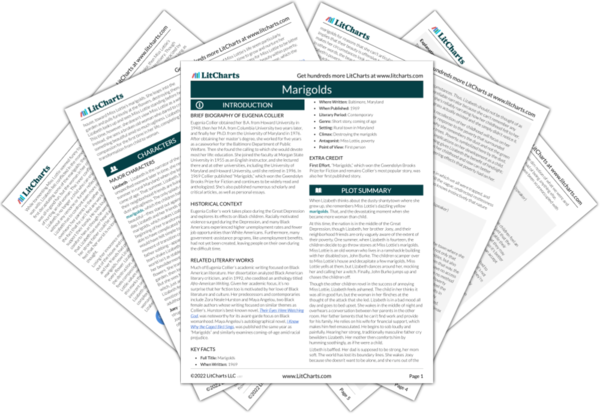Lizabeth Quotes in Marigolds
I don’t know why I should remember only the dust. Surely there must have been lush green lawns and paved streets under leafy shade trees somewhere in town; but memory is an abstract painting—it does not present things as they are but rather as they feel.

Unlock explanations and citation info for this and every other Marigolds quote.
Plus so much more...
Get LitCharts A+Poverty was the cage in which we all were trapped, and our hatred of it was still the vague, undirected restlessness of the zoo-bred flamingo who knows instinctively that nature created it to be free.
Miss Lottie’s house was the most ramshackle of all our ramshackle homes.
For some perverse reason, we children hated those marigolds. They interfered with the perfect ugliness of the place; they were too beautiful; they said too much that we could not understand; they did not make sense.
Perhaps we had some dim notion of what we were and how little chance we had of being anything else. Otherwise, why would we have been so preoccupied with destruction?
Suddenly I was ashamed, and I did not like being ashamed. The child in me sulked and said it was all in fun, but the woman in me flinched at the thought of the malicious attack that I had led.
“Ain’t no man oughtta eat his woman’s food day in and day out, and see his children running wild. Ain’t nothing right about that.”
The world had lost its boundary lines. My mother, who was small and soft, was now the strength of the family; my father, who was the rock on which the family had been built, was sobbing like the tiniest child. Everything was suddenly out of tune, like a broken accordion. Where did I fit into this crazy picture?
I gazed upon a kind of reality which is hidden to childhood. The witch was no longer a witch but only a broken old woman who had dared to create beauty in the midst of ugliness and sterility.
For one doesn’t have to be ignorant and poor to find that life is barren as the dusty roads of our town. And I too have planted marigolds.

Lizabeth Quotes in Marigolds
I don’t know why I should remember only the dust. Surely there must have been lush green lawns and paved streets under leafy shade trees somewhere in town; but memory is an abstract painting—it does not present things as they are but rather as they feel.

Unlock explanations and citation info for this and every other Marigolds quote.
Plus so much more...
Get LitCharts A+Poverty was the cage in which we all were trapped, and our hatred of it was still the vague, undirected restlessness of the zoo-bred flamingo who knows instinctively that nature created it to be free.
Miss Lottie’s house was the most ramshackle of all our ramshackle homes.
For some perverse reason, we children hated those marigolds. They interfered with the perfect ugliness of the place; they were too beautiful; they said too much that we could not understand; they did not make sense.
Perhaps we had some dim notion of what we were and how little chance we had of being anything else. Otherwise, why would we have been so preoccupied with destruction?
Suddenly I was ashamed, and I did not like being ashamed. The child in me sulked and said it was all in fun, but the woman in me flinched at the thought of the malicious attack that I had led.
“Ain’t no man oughtta eat his woman’s food day in and day out, and see his children running wild. Ain’t nothing right about that.”
The world had lost its boundary lines. My mother, who was small and soft, was now the strength of the family; my father, who was the rock on which the family had been built, was sobbing like the tiniest child. Everything was suddenly out of tune, like a broken accordion. Where did I fit into this crazy picture?
I gazed upon a kind of reality which is hidden to childhood. The witch was no longer a witch but only a broken old woman who had dared to create beauty in the midst of ugliness and sterility.
For one doesn’t have to be ignorant and poor to find that life is barren as the dusty roads of our town. And I too have planted marigolds.











